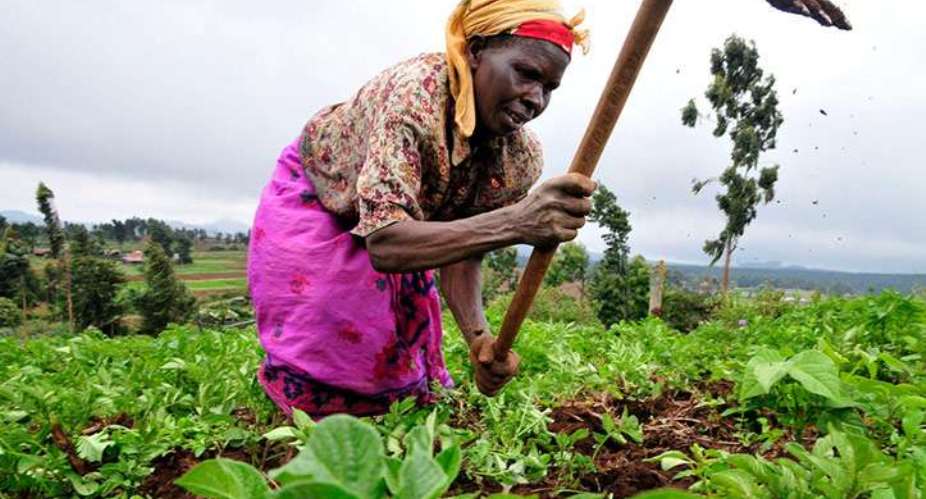Every year Ghanaian farmers are celebrated in recognition of their contribution to nation building. At these occasions, various speeches are made and part of such presentations assured farmers of better life in the coming years. It was around last year and issues affecting farmers were identified. But as to whether these issues have been tackled is yet to be known.
Fortunately, another Farmers Day is approaching and various speeches will be heard. However, one issue that remains a pinch on farmers is the change in climate. And farmers will want to know some pragmatic measures that the state is putting in place to mitigate the impact of this menace.
Climate change is an environmental issue that threatens our survival. One of the environmental issues that needs urgent attention is deforestation. In Ghana, selling timber to multinational corporations has been one way to earn foreign exchange. Available data suggest that Ghana’s intact forest has dwindled from about 8.2 million hectares in the 1900s to about 1.5 million hectares in 2010s. Timber from Ghana are used for furniture and roofing in Europe.
In the northern part of Ghana, wood is the available and cheap fuel for households. Some pick wood for fire while others process the wood into charcoal. All these activities depend on the trees in our forest. As the world continue to grow warmer, the function of the tree in taking in carbon dioxide and giving out oxygen becomes more significant.
Farming activities such as bush fires and arbitrary use of chemicals contribute significantly to deforestation. This practice couple with urbanization continues to rob us of our forest. This has a devastating effect on the lives of the people. This year, farmers up north may slip into poverty. The violent rains did not only destroy homes. Farmlands, crops and live stocks were washed away by flood waters. It became difficult for farmers to predict rains and so when to sow or plant was left to try and error. Many blamed this on the indiscriminate felling of trees in the north.
Therefore, with these negatives in mind, this year’s farmers’ day should be used to set the stage to deal with deforestation. One of SADA’s interventions in this regard was planting of trees. Unfortunately, this was a mess. The programme became a complete failure because there weren’t proper structures. The wrong timing for the planting and the lack of water facilities to support the farmers in the dry season contributed to the failure of the programme. If government is pursuing the same policy, then irrigation must be tackled even before the planting of the trees. Again, a lot of sensitization work ought to be implemented. In this way, farmers will have enough information regarding the best practices to handle trees and by extension our forest. Without these the government ‘Planting for Food and Jobs’ programme will bleed dry thus, threatening food security in the area.
Fear continues to grip farmers in the north as they prepare for the next farming season. They fear there may be extreme harmattan, which could have dire consequences. Also, the uncertainty surrounding the begging of the next rainy season is a great worry to yam farmers. These and other untold stories among the farmers call for urgent responses to tackle the menace of deforestation.
The theme for this year’s farmers’ day ‘Planting for Food and Jobs’ resonate with government programmes to create jobs through agriculture. And restoring our forest reserves can help create some jobs.
Zuberu Aliu
([email protected])





 Ensure private schools employ professional teachers, not SHS graduates — Xandy K...
Ensure private schools employ professional teachers, not SHS graduates — Xandy K...
 Alan Kyeremanten was the brain behind Ghana Card not Bawumia — Hopeson Adorye
Alan Kyeremanten was the brain behind Ghana Card not Bawumia — Hopeson Adorye
 I'm not running for office for power prestige, I just want to solve Ghana’s prob...
I'm not running for office for power prestige, I just want to solve Ghana’s prob...
 Provide immediate assistance to our displaced residents — Oda Nkwanta residents ...
Provide immediate assistance to our displaced residents — Oda Nkwanta residents ...
 Send nurses abroad; it’s a better option than being unemployed in Ghana — NDC Pa...
Send nurses abroad; it’s a better option than being unemployed in Ghana — NDC Pa...
 Bawumia stole free tertiary education for Persons with Disabilities from NDC’s 2...
Bawumia stole free tertiary education for Persons with Disabilities from NDC’s 2...
 Ejisu by-election: Anger is bound to occur but return to your 'sweet home' — Nan...
Ejisu by-election: Anger is bound to occur but return to your 'sweet home' — Nan...
 Limited voters registration: Don't allow politicians to engage your minors for p...
Limited voters registration: Don't allow politicians to engage your minors for p...
 Ferry on Oti River breaks down; drivers and passengers stranded
Ferry on Oti River breaks down; drivers and passengers stranded
